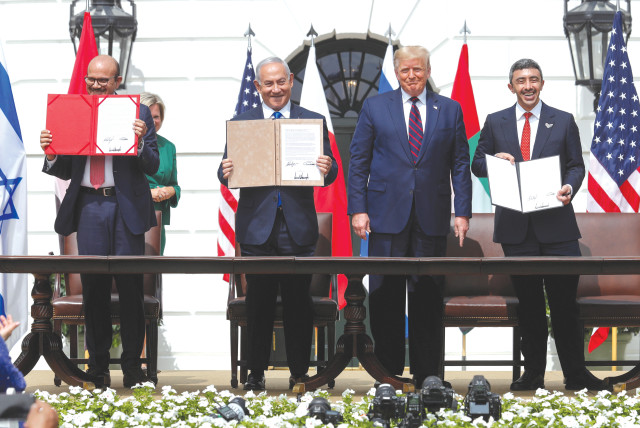Bahrain-Israel Peace is here to stay despite Gaza War, senior Bahraini envoy says

“You cannot keep changing sides every time you don’t like a government that comes into power in a country you have a relationship with,” says Sheikh Abdulaziz bin Mubarak Al Khalifa.
Despite the continuing Israel-Hamas war in the Gaza Strip and the resulting explosion of anti-Israel rhetoric in much of the Arab world, a Bahraini former ambassador to the United Kingdom and senior member of the ruling royal family says the Abraham Accords will remain firmly in place.
Asked by The Media Line about the Bahraini public’s increasing pressure to end ties with Israel over the war in Gaza, Sheikh Abdulaziz bin Mubarak Al Khalifa replied, “This will not happen.”
Al Khalifa, who served as Bahraini ambassador to the UK from 1996 to 2001 and has also held other senior administrative posts in the kingdom, said the Bahraini government "will not be phased” by such attitudes unless there is an overwhelming majority, which there is not.
Under the Abraham Accords signed in September 2020, Bahrain and the United Arab Emirates normalized relations with Israel, followed in December of that year by Morocco.
Al Khalifa said the roughly 50% Shia Muslim population in Bahrain “can at times be more sympathetic to extreme points of view … [but] you cannot keep changing sides every time you don’t like a government that comes into power in a country you have a relationship with. We see this not just with Israel but with many other countries.”
The sheikh made his comments at a small private online event hosted by ROPES, the Regional Organization for Peace, Economics, and Security, a nonprofit organization working to promote a regional Arab-Israeli peace agreement. ROPES aims to connect forward-thinking and emerging leaders from Israel, the Palestinian territories, and about 10 Arab countries, and its network of alumni includes members of parliament, diplomats, journalists, entrepreneurs, and venture capitalists.
The online event was hosted by ROPES Executive Director and former Knesset member Ksenia Svetlova. The organization's founder and president, award-winning foreign-affairs journalist Ben Birnbaum, spoke about ROPES' mission and work, and several employees and alumni spoke about their experiences with the organization, including Program Coordinator Amira Mohammed, an East Jerusalem Palestinian with Israeli citizenship, and Alumni Relations Director and co-host of the "ROPEScast" podcast Ibrahim Abu Ahmad, a Palestinian Israeli from the Nazareth area.
Antisemitism, Iran and Palestinians: What does the future hold?
Topics included antisemitism around the world, the future of the Abraham Accords, Iranian influence in the region, and peace prospects with the Palestinians.
Speaking of global anti-Semitism, Al Khalifa said, “What’s happening on campuses in the US and parts of Europe, you’d never see in the Arab world today. … You’d be wrong to assume that, even in religious countries like Saudi Arabia, there’s this widespread hatred of Jews.”
On Iran, the panelists discussed the need to expand the Abraham Accords.
“We all need to become part of a community that can face those kinds of challenges … and we would love not only the UAE and Bahrain and Morocco and the countries of the Abraham Accords, but all of the Arab world to be on the same side with Israel, with Palestine, fighting security threats from those other countries,” Al Khalifa said.
The hot topic at the event was the current Israel-Hamas conflict. The speakers acknowledged that there would be no going back to the status quo from before the attacks of Oct. 7, and ROPES was already focusing on what comes next. The speakers said the answer lies in the next generation of leaders.
"[Despite the] darkness that has engulfed us, we are proud in ROPES to have a resilient network of young leaders who are dedicated and still have their eyes on the ball, on the big picture … a post-war stabilized Middle East that fully integrates Israel and the Palestinians, ideally based on the two-state solution,” Svetlova said.
Al Khalifa said that the majority of Palestinians and the rest of the Arab world, apart from Hamas and other extremist groups, all want a two-state solution.
“So the ball is in the Israeli government’s court,” he said. “We need to figure out the boundaries and details, including securing safety for Israel that ensures Israeli people do not come under threat and can stay until the end of time. But the Palestinians deserve to live as normal human beings with freedom and ability to run their country independently.”
Al Khalifa said that taking a “baby steps” approach might be the best way forward. Signing a peace deal “doesn’t mean opening the gates right away," he said.
"It will take will and commitment and a period of trust-building… The Palestinians are going to continue to pose a threat if they continue living as they are,” he said.
But even more than this, Al Khalifa said that “the players have to change.” He said the Palestinian Authority is ineffective and PA President Mahmoud Abbas "understands that they need elections.” And he said the Israeli people also need both a change in leadership and a leap of faith.
“I think the Israeli people need to listen to people in the Arab world who say, we come as friends, and believe us, you will not be left alone with a future Palestinian state. We will be there to ensure the transition, and standing by to see that both sides stick to their sides of the deal,” he said.
Birnbaum said, “It’s not enough for Palestinians and Israelis to be the only ones at the table if we want a peace deal. Other regional actors must be involved.”
Jerusalem Post Store
`; document.getElementById("linkPremium").innerHTML = cont; var divWithLink = document.getElementById("premium-link"); if (divWithLink !== null && divWithLink !== 'undefined') { divWithLink.style.border = "solid 1px #cb0f3e"; divWithLink.style.textAlign = "center"; divWithLink.style.marginBottom = "15px"; divWithLink.style.marginTop = "15px"; divWithLink.style.width = "100%"; divWithLink.style.backgroundColor = "#122952"; divWithLink.style.color = "#ffffff"; divWithLink.style.lineHeight = "1.5"; } } (function (v, i) { });

